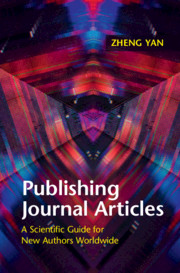Book contents
- Publishing Journal Articles
- Publishing Journal Articles
- Copyright page
- Dedication
- Contents
- Figures
- Preface
- Part I Nature of Journal Article Publication
- Part II Elements of Journal Article Publication
- Part III Strategies of Planning Journal Articles
- Chapter 6 How Should We Decide Target Submission Dates?
- Chapter 7 How Should We Choose Target Journals?
- Chapter 8 How Should We Identify Target Articles?
- Part IV Strategies of Writing Journal Articles
- Part V Strategies of Publishing Journal Articles
- Part VI Future of Journal Article Publication
- Index
Chapter 8 - How Should We Identify Target Articles?
from Part III - Strategies of Planning Journal Articles
Published online by Cambridge University Press: 27 October 2020
- Publishing Journal Articles
- Publishing Journal Articles
- Copyright page
- Dedication
- Contents
- Figures
- Preface
- Part I Nature of Journal Article Publication
- Part II Elements of Journal Article Publication
- Part III Strategies of Planning Journal Articles
- Chapter 6 How Should We Decide Target Submission Dates?
- Chapter 7 How Should We Choose Target Journals?
- Chapter 8 How Should We Identify Target Articles?
- Part IV Strategies of Writing Journal Articles
- Part V Strategies of Publishing Journal Articles
- Part VI Future of Journal Article Publication
- Index
Summary
The key to publishing journal articles is to demonstrate your contributions to your field of study. If we identify our target articles, it means that we know explicitly rather than implicitly what previous contributions are and what our contributions are. This chapter firsts present intuitive thoughts of students and three real-life cases (Robert, Zoey, and Young) and then discusses several pairs of core concepts, that is, highly-cited articles vs. low-cited articles, theoretical articles vs. empirical articles, and publishability vs. responsibility. Based on the discussion in this chapter, practical suggestions are offered: identifying target articles before, during, and after writing our manuscripts, especially when we review the literature; citing target articles and assessing scientific contributions of these articles; and focusing on the positive side rather than the negative side of target articles when we assess them.
- Type
- Chapter
- Information
- Publishing Journal ArticlesA Scientific Guide for New Authors Worldwide, pp. 82 - 92Publisher: Cambridge University PressPrint publication year: 2020

